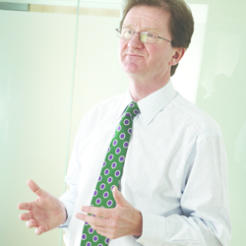Attendees at the Charity Commission’s public meeting yesterday debated the merits of formal training for charity trustees.
The issue of improving the competency and standard of trustee boards emerged as a theme throughout the event.
“We want to increase trustee self-reliance,” the Commission's CEO Sam Younger said in his opening speech reviewing the Commission’s new three-year strategic plan.
“This is not just driven by financial pressures (though they are clearly also a factor) – when we did our public review, the feedback gave a strong sense that since trustees are the ones that set the strategy and make the decisions, it’s in the interest of the sector that we should make it easier for them to do things themselves.”
Michelle Russell, the Commission’s head of investigations and enforcement, cited online guidance for trustees as one part of the organisation’s ‘emphasising prevention’ approach to tackling fraud in the sector.
Trustee competence a 'huge issue'
But it was during the audience questions that concluded the meeting that the theme sprung to life in open discussion.
The speakers agreed that it is vital that trustees have the skills they need for their role. Charity Commission board member John Wood called it “a huge issue and difficulty, which the Commission is very aware of”. He first suggested that umbrella bodies have an important role to play in making sure that trustees know what they are taking on with the role and to provide training, and then added that the private sector can also help. “[It] could encourage employees to do pro bono work and take up trustee positions.”
Neil Gerrard, former MP for Walthamstow and current trustee of Waltham Forest CAB, was cynical about the idea of accrediting trustees. “Frankly, if you told people they had to go through an accreditation process to become a trustee, I think it would be quite off-putting.” He suggested that one useful form of non-compulsory training could be inviting potential trustees along to observe the current board.
Liz Hudson, of a CVS in Cheshire East, contended that trustee training is vital. But the biggest problem is being able to fund the programme.
Suzie Morley, chairman of trustees at Debenham Village Hall & Playing Field Trust, told the room of her personal experience of joining a charity and being left in a “scary position” where she had to deal with unscrupulous and absconding co-trustees. She made a success of the situation, but said that she would have benefited hugely from prior training. However, she stressed that such a process would need to be available to those who wanted it, instead of “rules saying that you have to have this training”.
Wrapping up the meeting, John Wood said that the Commission would "take the issue of trustee training away and give it some serious thought”.
Discussion elsewhere in sector
The issue of formal trustee accreditation was also raised at last week’s Charity Law Association conference, where an audience member asked whether there should be a professional charity trustee qualification. The panel, which included Debra Allcock Tyler, CEO of Directory of Social Change, was sceptical, Allcock Tyler herself saying that some of the best trustees she has advised wouldn’t pass such a qualification.
Civil Society Media offers training courses for chairs and trustees. Click here for more details.










